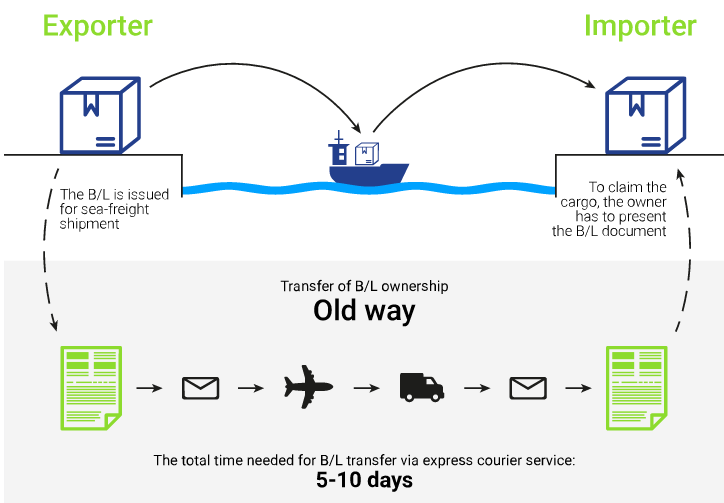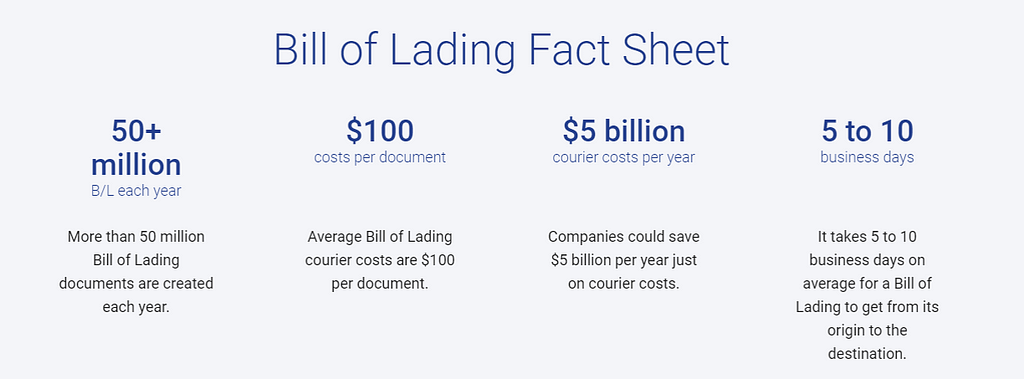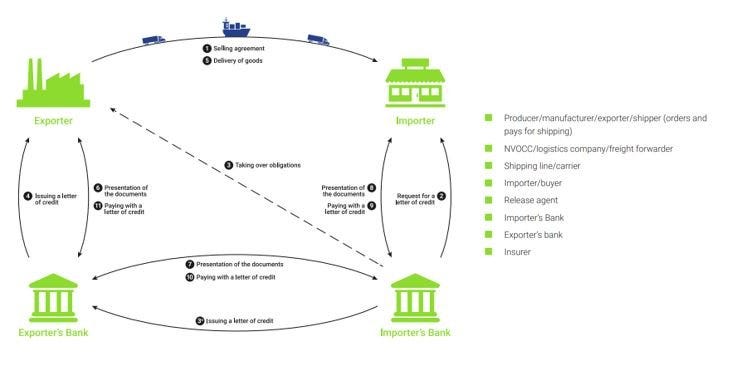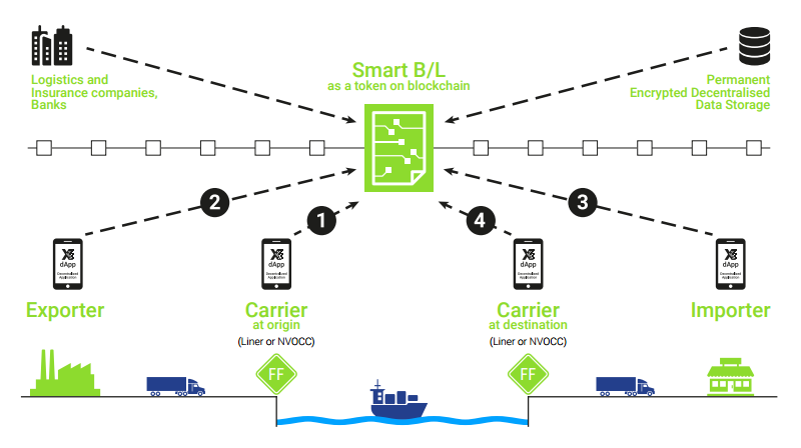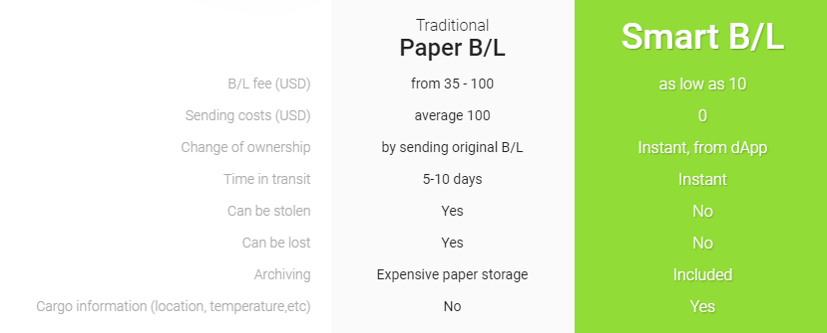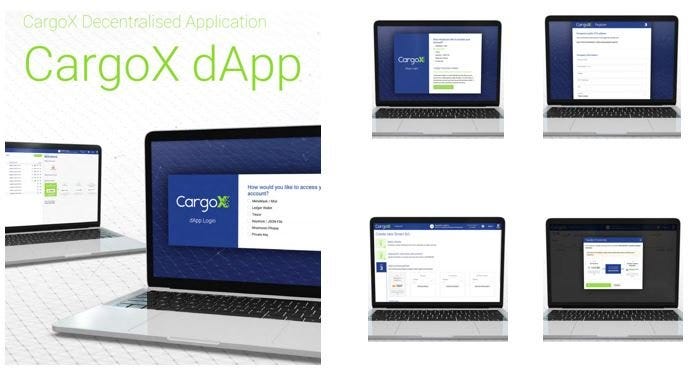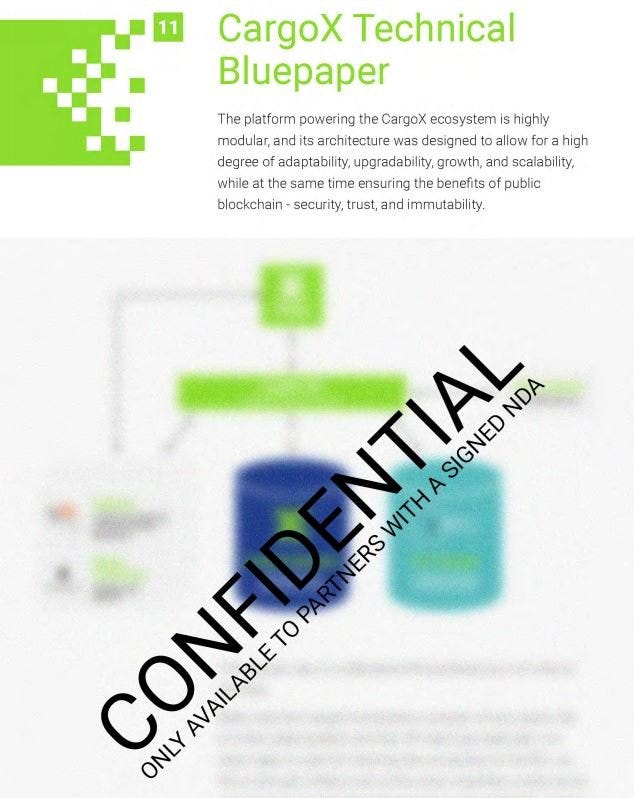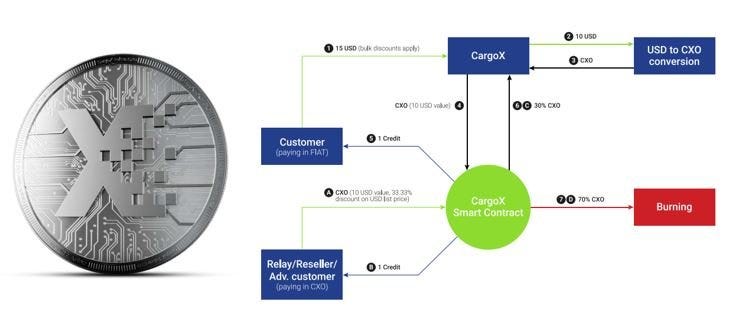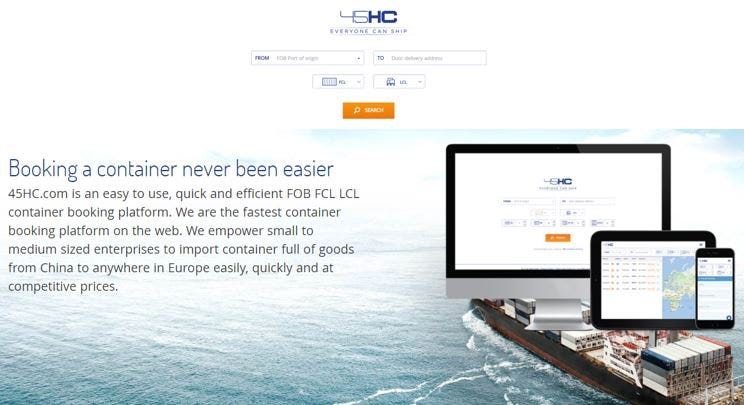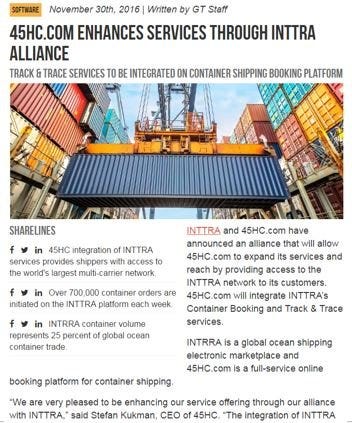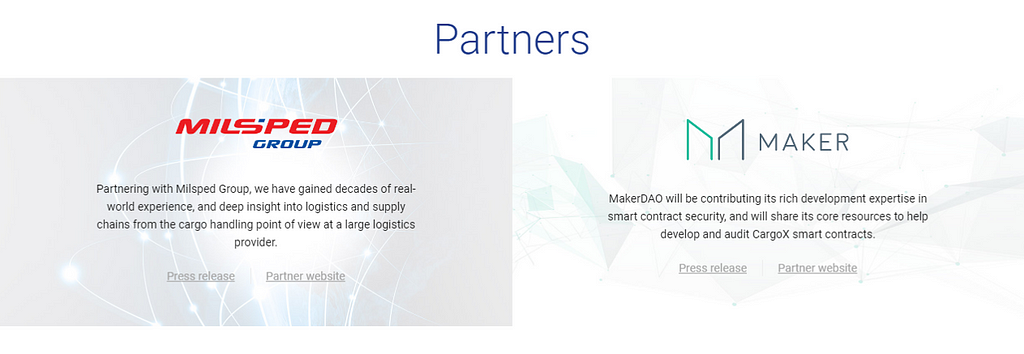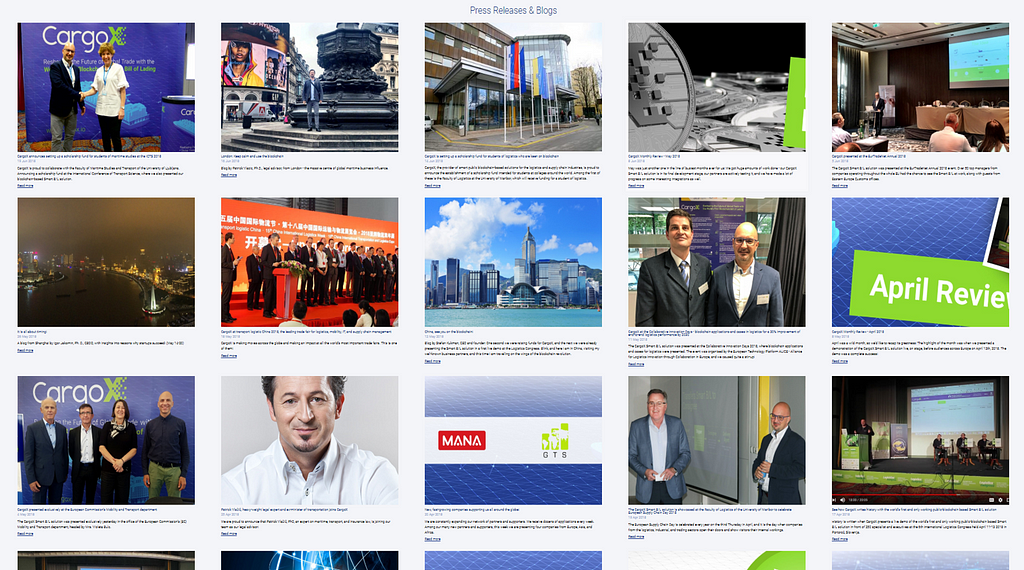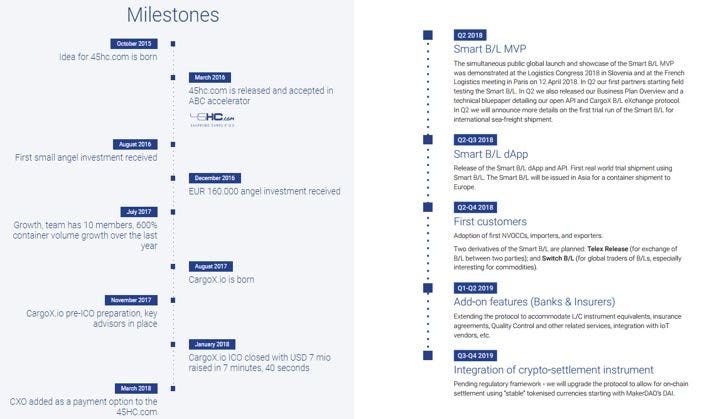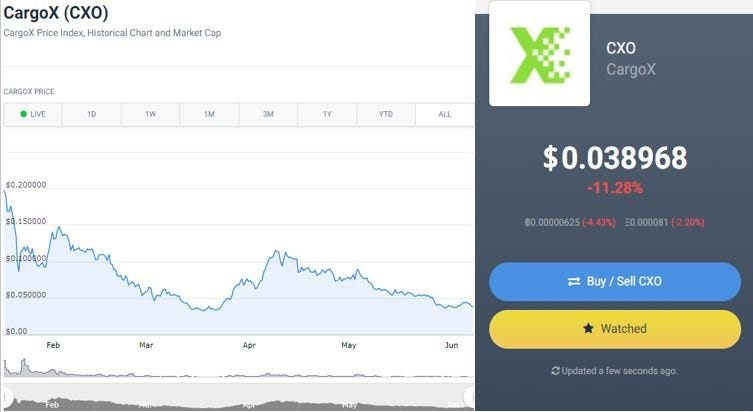Latest news about Bitcoin and all cryptocurrencies. Your daily crypto news habit.
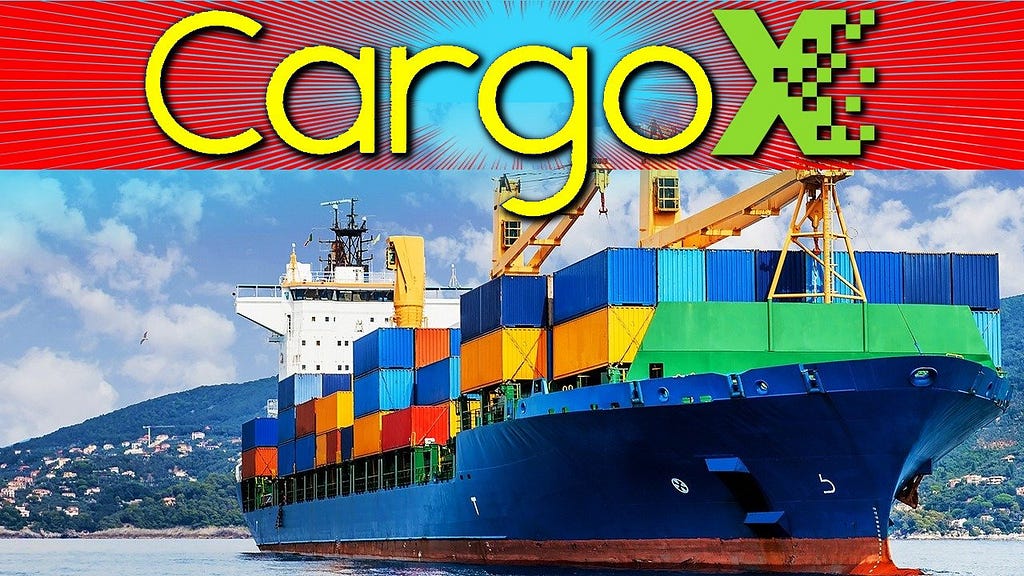
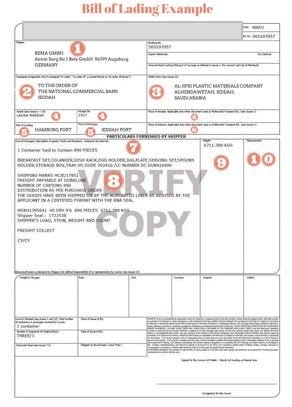
This is a document known as a Bill Lading. A Bill Lading (B/L) is a receipt for cargo transportation. So when a cargo is moved from port to port, there is acknowledgement and signing of the B/L to transfer the responsibility of the cargo to the next person.
The bill of lading doesn’t travel with the actual cargo. So for example, the cargo could be travelling by sea from port to port, but the bill of lading as a document would be sent by airplane and courier to the next port. This is to ensure if the cargo is lost at sea, the bill of lading is not lost and can be evidence of the worth of goods lost.
In this day and age, you would imagine this would be an electronic process by now, but it is not, it is still old school paper and snail mail, making it slow, expensive and unreliable.
Currently the average cost of sending a Bill of lading from one port to the next is about a $100 USD. And there are over 50 million Bill of ladings created each year, making the industry worth over $5 billion of courier costs each year. The average length of time is 5–10 days, depending on how far the ports are.
What is even more expensive is if the cargo reaches the port before the bill of lading for unforeseen circumstances. The cargo then has to be detained at the port for very high fees.
CargoX’s aims to transform the global shipping industry by securing Bill of Lading documents using blockchain technology. They will provide a way for importers and exporters to exchange these documents digitally, securely, and with no possibility of fraud in a neutral environment — extremely quickly and much more affordably than currently. Their cost will only be 10% of the current cost, literally 1000x faster, and as a blockchain technology, they will be the safest most untamperable open ledger of Bill Lading in the world. There is no other solution that can compare with theirs. And right now, they are the only blockchain project in the whole world addressing this issue. This is game changing technology.
As you can imagine, there are many parties involved in the shipping transportation route. There is the producer, the logistics company, the carrier, the importer, release agent and more. Traditionally, the hardcopy of the Bill of Lading would have to be transported between all of these agents before the cargo reached port. You can understand now why sometimes the Bill of Lading reaches port after the cargo.
CargoX introduces a new system known as Smart Bill of Ladings. This is an electronic copy of the Bill of Ladings that is created and managed with smart contracts, aka blockchain technology. The legal owner of the group can create a smart Bill of Lading in 20 seconds and it immediately becomes available for all parties to see and access. Because it is blockchain and decentralised, the information cannot be changed or hacked, meaning it is completely fraud-proof and secure.
This is a simple table comparing paper Bill of Ladings with Smart Bills of Lading. The cost of creating a Bill of Ladings can be as low as 10% that of paper. There is no sending costs or risk of lost/ damage as opposed to paper where the average cost is $100 with associated risks. There is no transition time with Smart Bill of Ladings as opposed to paper which takes 5–10 days to reach port. And there is no paper storage needed. Furthermore, Smart Bill of Ladings, can be incorporated with other supply chain solutions e.g. sensors to provide up-to-date information about the condition of transportation e.g. location, temperature of the containers etc…something which you would never get with Paper Bill of Ladings. So there is really no reason for a shipping company not to use Smart Bill of Ladings.
Potentially, this is a project that can combine with other projects e.g. VeChain or WaltonChain to form a partnership or even develop their own hardware sensors. Either way there is a lot of room for growth for this project.
If you’ve been in blockchain for a while, you would be aware that there are a lot of supply chain projects arising, starting with retail industry e.g. VeChain and Waltonchain, to food industry e.g. Wabi, Te-Food, Ambrosus etc.. and now the shipping industry as well. This is because with these fields, you don’t need super high transction speeds, what you need is a technology that provides a very open and secure ledger for a very affordable price and that’s exactly what blockchain offers. So moving forward, I think blockchain will transform the entire supply chain industry and all of these projects in the space right now, have early movers advantage and are potentially very good investments. Definitely worth knowing about.
CargoX has their own Dapp, that is a program with a very clean and easy to use interface that companies can install and use. There is also a very clear guide on their website, teaching how to use the App step-by-step.
Furthermore, the CargoX technology can be installed as an API instead of an app. An API is an app for an app. So e.g. your Uber App on your phone would have several different features, e.g. a GPS, a payment gateway etc.. these different features are APIs, whereas the Uber App is an App. CargoX will provide both an App option, but for companies that don’t want another App to use, they can simply integrate the technology into their existing business software as an API, so e.g. a simple drop down menu on the current program they are using.
There are some aspects of the technical bluepaper that is still confidential at this point. It may be due to patents or other reasons. So for that reason, so we can’ dive into the tech too much.
But their tech is quite intuitive to blockchain so I would imagine that it is achieveable. In fact their Smart Bill of Lading which is the core technology of the project has already been developed and is in pilot test now with a couple of companies. The main product launch is expected in Q3 2018, so very soon.
Token Use
The entire system is run on CXO tokens to ensure token use and demand. But instead of torturing their customers to need to set up and exchange account, learn how to buy cryptocurrency etc.. they have developed a transparent process for topping off customers CXO credits balance when they pay their invoices with SEPA/ SWIFT bank transfer. The cost of each CargoX Smart Bill of Lading is exactly USD $10 and that will be converted to CXO tokens. CargoX will also have a treasury wallet to serve as buffer for the fiat-CXO conversion.
Pegging the price to USD and having a buffer are great features to further promote mass adoption, because it removes the risk and concern enterprises have about the volatility of cryptocurrency.
Remember we pointed out earlier that in a single transportation there are many parties involved? Only the initial owner who creates the smart Bill of Lading pays the $10. Every other party gets to use the technology for free. So for most of the parties, it’s using a great technology for free. Before you get concern, that the token is being under utilised compared to other blockchain projects, consider the cost. $10 sounds very little compared to the $35–100 transaction fees paper Bill of Ladings would cost, but with the exception of Bitcoin and Ethereum, other blockchain projects charge very little for a transaction. Stellar Lumens for example, charges 1 cent for 60,000 transactions. So in blockchain terms, $10 for one transaction could be seen as very high. It won’t affect the use of the project, because this fee is still the cheapest in the market, but it will guarantee demand.
Other uses of the tokens besides Smart Bill Ladings creation include, other services e.g. arbitration if there is a dispute, payment for other services provided by their partners, payment for sea freight on selected web logistics portals with discounts of up to 30% for using their token to pay.
If token use isn’t enough, one more thing in the token economics that token investors are going to love, is the token burn. CargoX has a crazy token burn rate. After the $10 is used to purchase the Smart Bill of Lading and converted into cryptocurrency, 70% of that, so $7 worth of token will be burnt and permanently removed. This is a very high rate of burn and will significantly affect inflation. Which means, all other factors even, the earlier an investor gets into the project, the better, because with every burn the price of the tokens will get inflated more and more permanently, and 70% is again a very significant amount.
CargoX will set the CXO token burn percentage yearly, so it won’t always be 70% but for the first year it will be 70%.
The parent company behind CargoX is a Slovenian container booking platform known as 45HC. They specialise in helping small to medium enterprises get their goods from China to Europe at competitive prices, and they are currently the fastest container booking platform on the web.
45HC is also in an alliance with INTTRA, who is the largest neutral electronic transaction platform and information provider for the ocean shipping industry. They initiate over 700,000 container orders weekly and represent approximately 25% of global ocean container trade. So whilst 45HC may not be Maersk the world’s largest shipping company, they certainly are a significant player in the field.
The thing about CargoX as a project is that CargoX is a not a logistic company like Maersk or INNTRA. They are specific to streamlining Bill of Ladings, which is a problem every logistic company in transportation faces. Meaning every logistic company e.g. Maersk, INNTRA, 45HC etc.. can use their technology. They are aiming to be another company in the transportation industry, they are aiming to be a game changing technology that every company in the space can use.
Although they haven’t lauched their working product yet, they already have 2 partners currently, Milsped a leading transportation company and MakerDao a respected team in the Ethereum developer community.
Partners are enterprises that will be using their service. They are currently offering early partner advantage such as 1000 free Bill of Ladings, possibility of tailor made features and prioritisation etc…
The project also has supporters, who are considering signing on with them. For them, CargoX offers them free consultation and an insider glimpse into an actual testing and working of the blockchain technology. Supporters will also get priority onboarding if they decide to start using CargoX smart Bill of Lading.
They have quite a few supporters already, including significant names like Samera and Co, Republic of Solvenia (Ministry of Infrastructure) — potential government partnership!, MANA and TPG.
A lot of the bigger companies will probably require working testimonies before they jump on to a new technology, so I suspect, once CargoX launched it’s live product in Q3 and start getting a few more partners, the Slovenian government and big companies will probably jump on then and that’s when the project will really gain a lot of tractions.
If you go on their website and check out their blog, the team has been very active in building partnerships and promoting their product. They recently presented at EurTradeNet 2018, Transport logistic China, collaborative innovation Days 2018 — organised by ALICE (Alliance for logistics Innovation through Collaboration in Europe) and more. The thing I want to point out from here is that all their marketing has been targeted at real world logistic seminars and events. None of it has been at Blockchain events like concensus. That is why this project is so unknown to crypto investors at this point.
But I believe one day soon, once they have a working product and attract big partnerships e.g. Slovenian government, this will all change, and the crypto world will be blown away by this hidden gem. At that point, it will probably rise very quickly and steeply. This is a project that has very good fundamentals but is currently very undervalued.
Team
This is the team behind the project. It’s a good team with a lot of experence and success, and well balanced in both the business and technical aspects.
Their CEO and founder is Stefan Kukman who is also the CEO of 45HC. He previously worked with one of the largest logistics providers Kuehne-Nagel and has a very strong background in product promotion and market research.
Their COO is Igor Jakomin who has more than 20 years of experience in transport, logistics and shipping industry. He was the previous State secretary at the Ministry of transport of the Republic of Slovenia, an experienced lectured and assistant professors at various universities with a PHD in transport and logistics and also previous managing director of Samer Global logistics, and Supervisory Board member of Port of Koper and BTC terminal.
And you can go through the rest of the resumes in your own time, but it’s a heavy weight team that inspires confidence.
Roadmap
They have 2 versions of a roadmap. The first one on the left is the one on their website which is actually outdated and ended 3 months ago. They need to update it.
A longer pitched roadmap is found in their technological paper and that runs to the end of Q4 of 2019. We are at the beginning of that roadmap, right after releasing Smart Bill of Lading MVP (minimal viable product) and awaiting the launch of the Dapp and first customers.
Other longer term feature they are hoping to include next year involve extending the protocol to accommodate insurance, quality control, integration with Internet of things (IOT) vendors (mostly like the sensors in the containers we were talking about before) and more. So once again, a lot of room for this project to grow.
Conclusion
Finally, I wanted to round off this article with a look at the token price, because I feel it’s in quite an unusal position. If you see from the chart, since being launched in late Jan, the token price has taken a real beating.
At its peak right after it hit the exchanges, it peaked at $0.23 and currently it is sitting at $0.038. It’s dropped by 85%. This isn’t because of the project, this is because of the general market crash. The thing with the crypto market, is this thing called Bitcoin Dominence. Bitcoin is the biggest coin on the market by far. And when the market is good and people are more risk taking, they will invest in altcoins like CargoX. But when the market is bad and people want to be safe, they will take money out of altcoins like CargoX and put it back in Bitcoin. So in bear markets like the past few months, we see a general rise in Bitcoin dominance and all altcoins suffer, the smaller the altcoin, the more it hurts, because people will have less confidence in them.
The thing about CargoX is even at ICO stage, it was very low capped at $7million, (normal ICO is $30–40 million). So even at launch it was in marketcap, which normally would have made it a great investment opportunity, but it ended up instead being unintentionally punished for that and got pushed down even further as investors moved to Bitcoin. That’s what I think happened at least.
And now, I think we are at an interesting spot where the market is possibly close to it’s lowest (I hope), but also the project already has an minimum working product and are about to launch their life product. They have partners in pilot testing and are soon to have real customers/ partners, including big enterprises and the Solvenian government expressing interest in the project. Once the product goes life in the next quarter, token burn will start, and inflation will being. They are also focusing heavily now on transportation partnerships and haven’t started marketing to the crypto community yet, but I see that changing in the next 6 months. And finally, with every market crash, when the market picks up, investors are abit wiser and more investors start looking for projects with good fundamentals rather than FOMO as they have been doing, and you can see this with recent conferences and forums. Crypto investors are not asking “when moon” or “when lambo” so much, they are starting to ask about the technology, the token economics etc.. even within 1 year, you can see the overall maturity and education of investors rising significantly. To an investor looking at projects with good fundamentals, CargoX potentially comes across with alot of potential. This is a project worth keeping an eye on.
These are my thoughts on CargoX. None of this is professional advice, it is all my personal opinion and thoughts. Always do you own research and make your own decisions.
Let us know what you think of CargoX in the comments below, and your comments will also help others form their opinion of this project.
If you found this post helpful, give it that clap so that others can find it too. Have a great start to your weekend wherever you are, and Il catch you again very soon!
CargoX (CXO): Blockchain transforming the transportation scene was originally published in Hacker Noon on Medium, where people are continuing the conversation by highlighting and responding to this story.
Disclaimer
The views and opinions expressed in this article are solely those of the authors and do not reflect the views of Bitcoin Insider. Every investment and trading move involves risk - this is especially true for cryptocurrencies given their volatility. We strongly advise our readers to conduct their own research when making a decision.
